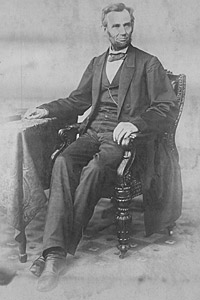 Abraham Lincoln is the only president to appoint a tenth justice to the Supreme Court. He made five appointments, one of the most prolific appointers-in-chief in our history. And it all started because of Dred Scott.
Abraham Lincoln is the only president to appoint a tenth justice to the Supreme Court. He made five appointments, one of the most prolific appointers-in-chief in our history. And it all started because of Dred Scott.
In 1857, Chief Justice Roger Taney wrote the 7-2 majority opinion denying Dred Scott and his family the right to live as a free man, returning him to slavery. Taney further declared that African Americans can never be citizens and had no rights to which white men were bound to respect. One of the two dissenters, Justice Benjamin Curtis, was so disgusted he left the court to return to private practice. The second dissenter, John McLean, died a few weeks after Lincoln’s inauguration in 1861. John Campbell, a pro-slavery firebrand, resigned from the Court to become the Confederate Assistant Secretary of War. Lincoln had several vacancies to fill immediately. He did so by nominating Noah Haynes Swayne, Samuel Freeman Miller, and his old friend David Davis, all of whom the Senate quickly confirmed.
While all of us today have seen nine justices all our lives, the Constitution doesn’t actually specify how many Supreme Court justices will sit. Early on that number varied between five and nine. Congress decided to deal with the complications of the Dred Scott decision (including its rather pro-slavery leanings) by adding a tenth justice to the Court. So in 1863 Lincoln was able to fill the extra seat with Steven Johnson Field. Chief Justice Roger Taney then died in October of 1864. After Lincoln won the election in November, he nominated his former Treasury Secretary Salmon P. Chase as the new Chief Justice, his fifth justice appointed. Interestingly, the Court still ruled against Lincoln posthumously in an 1866 case known as Ex parte Milligan in which they determined the Lincoln administration had exceeded its authority by relying on a military tribunal to convict Lambdin Milligan and three others, stating that Indiana civil court should have been employed for the trial.
After Lincoln’s assassination, Congress decided it needed to limit the ability of his successor, Andrew Johnson, from appointing pro-slavery justices to the Court, so they reduced the number to seven. Immediately after Johnson was out of office, Congress reset the number again to nine, and since 1869 that has been the standard to today.
Which means there is precedent for changing the number of justices on the Supreme Court to thwart racist and anti-American behavior by presidents (and the Court itself). That said, there is a reason that the Court has remained stable at nine justices since the aftermath of the Civil War. Also, ten – or any other even number – sets up the potential for a Court mired in constant ties, for which there is no remedy (unlike the Senate, where a tie is broken by the Vice President’s vote). Which means any change in current circumstances would have to be to add two justices to reach eleven. Can it be done? Yes. Should it? That depends on the honesty and integrity of the Senate and President, something that we’ve seen is not always guaranteed.
David J. Kent is an avid traveler, scientist, and Abraham Lincoln historian. He is the author of Lincoln: The Man Who Saved America, Tesla: The Wizard of Electricity and Edison: The Inventor of the Modern World as well as two specialty e-books: Nikola Tesla: Renewable Energy Ahead of Its Time and Abraham Lincoln and Nikola Tesla: Connected by Fate.
Check out my Goodreads author page. While you’re at it, “Like” my Facebook author page for more updates!



 Abraham Lincoln may have been a “merely country lawyer,” as some of his critics avowed, but he had many far-reaching interactions with the U.S. Supreme Court that changed the face of jurisprudence. I’m reminded of this today because on December 6, 1864, Lincoln nominated former Treasury Secretary, and constant foil, Salmon P. Chase to be the next
Abraham Lincoln may have been a “merely country lawyer,” as some of his critics avowed, but he had many far-reaching interactions with the U.S. Supreme Court that changed the face of jurisprudence. I’m reminded of this today because on December 6, 1864, Lincoln nominated former Treasury Secretary, and constant foil, Salmon P. Chase to be the next 







